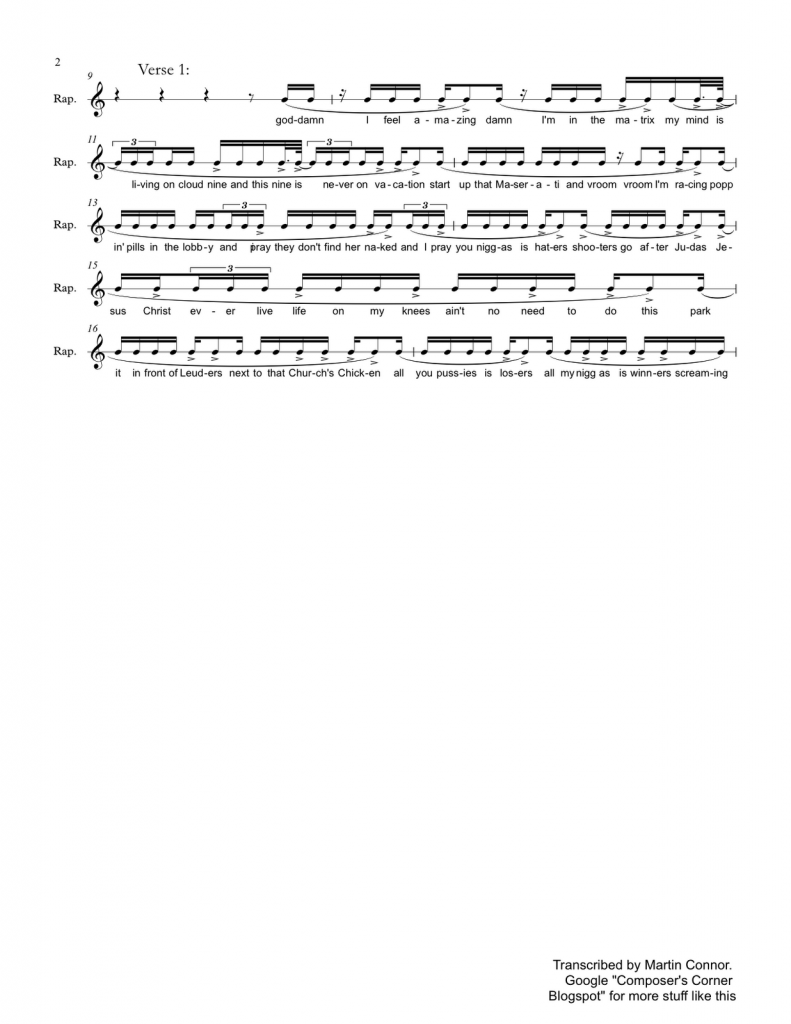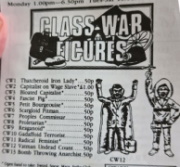|
ProfessorBooty posted:Been thinkin hard lately about American culture. I'm trying to be more fabulous and poo poo, putting my outfits together and looking like a well groomed happy beardo. here's another important part of american culture: telling dweebs with their head up their own rear end to kill themselves
|
|
|
|

|
| # ? May 6, 2024 01:07 |
|
I, of course, would never say such a thing, just adding to the discussion of course of course
|
|
|
|

|
|
|
|

|
|
|
|
Ardennes posted:It doesn't exist beyond a conduit to make money, it isn't that there is actual culture inside America's borders but it is pretty much instantly co-opted and exploited as quickly as possible. It isn't a profound statement, it is just how America works. Ha, NYC finally got so expensive that it kicked me out this year. I felt NYC died in the 2010s, the period of last term of Bloomberg and the start of the deBlasio admin. I know the first blow started post 70s, but I was a child of the 90s. The city feels dead. I took a trip back to the Bronx, where I used to live and it just feels like more despair from black, PR and Dominican population and the same feeling (but not as bad) when I headed out to Queens and Brooklyn with the lower class Asian and Latino population. I think white people in the city have gotten even more racist on an interpersonal basis. I felt like I made it out of a drowning sinkhole and I feel a little sorry for some of my friends that are still barely subsisting there. They are also like me, one lovely landlord decision of being kicked out and forced to move possibly upstate or even out of state.
|
|
|
|
Weka posted:nobody knows what that is dummy babies naturally sing pentatonic (5-tone) scales around the world its a series of perfect fifths on the circle of fifths, perfect fifths are 3:2 intervals, this is also the rhythmic timing interval for one of the simplest syncopated polyrhythms, the hemiola https://www.youtube.com/watch?v=QCSZ9SyBm_8 tempo almost always falls within about 60-180 bpm which is about the range of human heart generally between 80-120 which is roughly walking pace the simplest rhythmic interval for a repeating piece of music is 2 the next is 3 3 is awkward to walk to at a steady pace 4 is not your hands can still do something as you step You have a voice people likely didn't invent instruments before inventing music people probably used their voices in music, since babies sing things so the earliest music probably involved vocal and percussive elements, in simple (2,4) metric divisions with pentatonic melodic structure, or droning ( or atonal/fixed pitch/chanted etc) vocal portions and then more complex syncopated percussion (i.e. hemiola) delivered by foot stomps. hand claps, vocal noises etc over metric divisions of 2 or 4 pulses while walking, later adding more complicated syncopated subdivisions to dance to, then basing things only on those subdivisions etc. by then you would probably get words if you don't already, but they're gonna be before any instruments, probably before rhythmic complexity past 2 people remember rhymed things easier, people chunk information better if it's rhymed, if it fits u must acquit people didn't invent music after writing people would've found a lot of utility in storing information orally before developing writing in particular like there's some wiggle room but all of the core concepts in hiphop, not like recorded hiphop but the concept of rhythmic, rhyming vocals, syncopation, percussion, are all going to be either in one of the first few musical developments or maaaaaybe first like, 4 or 5 no matter where you are all around the world, there's only so many ways for things to rly start, it can go wherever after that but people aren't gonna start off with any kinda harmonization or ultra-complicated tonal or rhythmic stuff or complex or big instrumental things
|
|
|
|
clean ayers act posted:ahem! Smaller then the Empire State
|
|
|
|
FirstnameLastname posted:babies naturally sing pentatonic (5-tone) scales around the world bud I think you are describing "singing" hop hop originated in late 60s/early 70s new york as an offshoot of the r&b scene that mixed with the spoken word poetry that had been popular there throughout the 60s
|
|
|
|
NFL Red Zone channel is the peak of American culture
|
|
|
|
Pentecoastal Elites posted:bud I think you are describing "singing" shakespeare was sort of the first rapper when you tihnk about it
|
|
|
|
WampaLord posted:NFL Red Zone channel is the peak of American culture I might have to reconsider my position. did not think about sam spence
|
|
|
|
A single noodle from that box would kill every living human in 1382 instantly
|
|
|
|
|
That Soviet cartoon is great, toasted our asses
|
|
|
|
Chinese takeout and pizza delivery
|
|
|
|

|
|
|
|
Deep stuff, OP. I don't think anyone's ever answered that question before. Whither goest thou America, in thy shiny car in the night? Peanut President posted:here's another important part of american culture: telling dweebs with their head up their own rear end to kill themselves
|
|
|
|
American "culture"
|
|
|
|
Pentecoastal Elites posted:bud I think you are describing "singing" im taking about the part of hip-hop that is sharing information and telling stories through rhythmically rhymed patterns which is distinct from singing, by not necessarily being tonal and from poetry by being distinctly musical in nature people started doing it into a microphone at parties in the '70s and putting drum machines behind it but they didn't invent "rappin" then, that shits old, it comes from largely unwritten traditions brought to the us thru the afrocarribean & originally from west africa, esp. Mali, Senegal, Gambia https://en.m.wikipedia.org/wiki/Griot quote:Most villages also had their own griot, who told tales of births, deaths, marriages, battles, hunts, affairs, and other life events blues, which birthed jazz, rock etc. has a fairly similar origin
|
|
|
|
ok
|
|
|
|
not but for real op, get a loving job you bum
|
|
|
|
metallica
|
|
|
|
america is win and jazz is NOT cringe
|
|
|
|
american culture is basically mass media, cheap consumer goods, and cars. that combo produced john coltrane and bacon cheeseburgers, though, so not a total waste imho https://www.youtube.com/watch?v=xy_fxxj1mMY also, they call it free jazz but you can also listen to it for free! wow! https://www.youtube.com/watch?v=h2q_ai2Ct-8
|
|
|
|
|
https://www.youtube.com/watch?v=_bpS-cOBK6Q
|
|
|
|
https://www.youtube.com/watch?v=UHvnWcxMF9o
|
|
|
|
FirstnameLastname posted:im taking about the part of hip-hop that is sharing information and telling stories through rhythmically rhymed patterns which is distinct from singing, by not necessarily being tonal and from poetry by being distinctly musical in nature cool way of looking at it tbqh
|
|
|
|
Pentecoastal Elites posted:the only actual culture america has was made by jews and black people until the neoliberal era when the market finally figured out how to eat that too. everything else is just the half-remembered traditions of german drunks and imperial propaganda Well now we get to see how NeoLiberalism cannibalizes internet Incel culture. How long till we see "Looksmaxing" in a skincare commercial?
|
|
|
|
plano, texas
|
|
|
|
ELTON JOHN posted:cool way of looking at it tbqh ty like im not holding a solid belief people were spitting bars 30,000 years ago, but think there's enough evidence it's a continuance of older things combined with newer ones and not something people thought up on accident once they had a turntable and mic and that the older parts stand to be very very old since in addition to their connection to griot traditions, they also all don't require things like a unified system of tuning or writing or measurement so there's also nothing that would've stopped people from spitting bars 30k years ago imo its not fair how the popular perception of black cultural history in America is that it pretty much all starts after slavery (almost entirely wrt music ) and all the cultural contributions black american & afrocarribean ppl have made to music sort of hang in a vacuum, popping into existence as fully realized and young things that are new and have no cultural, historical, geographical etc. connections, no heritage, etc. when it's actually there, it's just not studied, displayed or appreciated the same way as traditional demon cracker western art-music culture, and in the commercialized evolution of the different art forms, the heritage, continuity, political consciousness all gets clipped away entirely then people think black american culture doesn't exist or is a pile of bet stereotypes or Kwanzaa for some reason FirstnameLastname has issued a correction as of 04:40 on Dec 15, 2023 |
|
|
|
Yeah, I find myself very admiring of Black American culture, I really do like to think about the world in which "black" politics took hold and won out. So maybe real American Culture is the culture that sprouts in spite of it all? To stuff my head in my rear end a moment.
|
|
|
|
musical recitation is one of the oldest things around but basic structural elements of hip hop like 4/4 bars in power of two blocks are somewhat newer as an aspect of those recitations
|
|
|
|
Ohtori Akio posted:musical recitation is one of the oldest things around but basic structural elements of hip hop like 4/4 bars in power of two blocks are somewhat newer as an aspect of those recitations it comes from the same place as the 12 bar, 16 & 32, bar aa'ba blues that structure is rly old, the first written record in the us is right after the end of slavery its just new as a popular musical convention in the west quote:“I am Howard Carroll, guitarist for the Dixie Hummingbirds. I am 93 years old and played guitar professionally for 70 years. My friends call me the Father of Gospel guitar. I don’t know about that, but I was one of the first to bring guitar to gospel music. I am in a nursing home now and can no longer travel, but I want to thank you for taking me to Segou, Mali. I come from a musical family, and we can trace back to the slave holder, Charles Carroll, and his plantation in Maryland. The plantation buried our history alive. Took away our name, took away our language, took away our religion, but they did not take away our spirit or our music. Over a hundred years ago my father played banjo, guitar, mandolin and others. He taught me to play when I was 5 years old. My father had a finger style on the banjo not unlike Mali musicians playing the Mali banjo, the n’goni. I believe our family came from Mali and were musicians. Thank you for taking me home after 300 years away.” bc built off the same structure, instead of a blues riff you have a drum loop instead of singing you have rhyming that's all that really changes every single early rapper every single original rapper grew up listening to their parent's '50, ,60s, 70s R&B funk, soul, rock, jazz, so they followed that structure & everything else followed suit quote:
also the vocals don't have to be in 4/4 at all & neither does the instrumental, although the instrumental usually is (madvillainy by doom, flylo, outkast, kendrick, eminem have weird time sig songs)  
|
|
|
|
https://adamhudson.org/2021/09/15/the-african-roots-of-african-blues-music-the-blues-scale/ here's what I was pasting quotes from by the way It's really long but goes into way more detail
|
|
|
|
to be clear i mean that power of two blocks are ~centuries old instead of ~millennia old. i also think it's easy to overstate the influence of blues specifically on hip hop; the 12 bar form for example is essentially not present in hiphop. rather as youve said the influence is through midcentury american popular music, which almost entirely discarded the 12 bar form the rhythmic extracts you pulled are very clearly 4/4 with barline crossing syncopated rhythm. the existence of tracks which violate a basic structural principle for kicks dont make it any less a basic structural principle of the genre
|
|
|
|
reggae, another major hiphop influence is also in 4/4, as is dancehall etc - that boom-paboom-pa drake beat, he stole it from Jamaian immigrants in Toronto bc hes a lil weinrpp
|
|
|
|
fnln you may enjoy this twitter account https://twitter.com/mannfishh/status/1735396744710816161
|
|
|
|
i mean western musics pretty much converged on 4/4 unless youre pointedly trying to be novel or youre writing a waltz for a specific reason. "yeah i think people are gonna want to dance to this" -> 4/4 brother. hiphop is a 4/4 genre because the stuff it got assembled out of is already 4/4, without that musical connective tissue theres no reason it would be because its just rhythmic recitation
|
|
|
|
Ohtori Akio posted:to be clear i mean that power of two blocks are ~centuries old instead of ~millennia old. that's the first written recording in the us, Africans weren't in the us thousands of years ago goof i don't think that stuff's thousands of years old because that's early instruments, but more than 200, the links just aren't really covered academically because white people ignored black people in music academia as much as they could until about 40 years ago and it's still really bad it's totally present tho, it's not the blues, but you can see the same musical structuring even in like, rappers delight the verse chorus verse chorus bridge verse chorus modern pop & rock music structure altogether is from blues, ragtime, bigband jazz standards are all reharmonized old contemporary pop songs built off blues songs, new orleans big band, showtunes, and blues songs hip-hop also has a lot in common with jazz wrt the nature of improvisation & collaboration in the genre its all influenced each other a lot more than it seems looking back at it but if you go to where popular music starts you can see just how little of it came from the west altogether, white people just stole all the credit it's what pretty much all of rock and 50s pop music and stuff sprang from, all modern music anyone cares about basically lol, came from that stuff, which all came from west african musical traditions that get no cred
|
|
|
|
like i just said dude the influence is mediated through midcentury american popular music which we both know has an extremely strong blues influence.
|
|
|
|

|
| # ? May 6, 2024 01:07 |
|
when we say "everything is the blues now" we deny the blues any specificity. the blues are a very specific thing and most people are influenced by its descendants rather than for instance having leadbelly on repeat. i mean everyone should have leadbelly on repeat but they dont. i will concede however that 12 bar forms are more present in hiphop than i previously thought
|
|
|
































